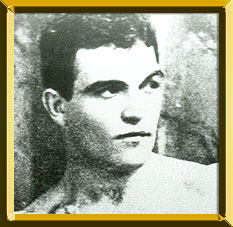
One of the finest heavyweights in history, James J. Jeffries retired undefeated but, six years later, was coaxed into an ill-fated comeback fight with Jack Johnson.
Jeffries moved with his family from Ohio to a Los Angeles-area farm at the age of seven. As a youth, he was a great athlete who distinguished himself in boxing, wrestling, and track. While working as a boilermaker and for a meat packing company, among other jobs, Jeffries boxed at the East Side Athletic Club. In his first professional fight, he knocked out Hank Griffin in the fourteenth round. Nineteen at the time, Jeffries waited until he was 21 to box professionally full-time, honoring a promise to his parents.
Jeffries fought draws with Gus Ruhlin and Joe Choynski in 1897. The next year, he won five fights, including a knockout victory over Peter Jackson and a decision over Tom Sharkey, whom Jeffries would later call his toughest opponent. He also went to New York, where he agreed to fight twice in one night. He won a decision over Bob Armstrong, but broke his thumb and had to cancel the second bout. Jeffries was shaken by the crowd's boos and returned to California.
Jeffries then came under the direction of a new manager, William A. Brady, who was able to sign his man for a match with the world heavyweight champ-ion, Bob Fitzsimmons, at the Coney Island Athletic Club. Jeffries embarked on an arduous training regimen for this bout. With the help of middleweight Tommy Ryan he devised a new fighting style which he intended to try out against the lanky Fitzsimmons. Jeffries fought in a crouch with his left arm extended and his face protected by his right forearm. He developed a terrific left hook, as well as a straight left he could throw out of the crouch, often at short range and with great effect.
In the championship bout, Jeffries knocked Fitzsimmons down in the second round. Early in the fight, Fitzsimmons landed some hard punches, but Jeffries' blows were more effective. In the tenth, Jeffries knocked the champion down twice with powerful lefts. In the eleventh, Jeffries finished off Fitzsimmons with a left hook and a right uppercut. The new champion then won a very tough 25-round decision over Sharkey before facing the former champion James J. Corbett. Jeffries had previously served as Corbett's sparring partner and welcomed the chance to best him in the ring. Corbett had the advantage in the first ten rounds and, after twenty rounds, still had a clear lead. But in the 23rd, Jeffries knocked Corbett out with a straight left and then a left hook to the jaw.
Jeffries defended his title four more times with four knockout victories before retiring. Included among his victims were Fitzsimmons, Corbett, and Ruhlin. After six years of retirement, at age 35, Jeffries returned to the ring in an attempt to wrest the championship from Jack Johnson. Though out of shape at the time he signed for the match, Jeffries brought himself into condition. Touted as a "Great White Hope," Jeffries was nevertheless no match for Johnson, who knocked him out in the fifteenth round. In retirement, Jeffries owned a bar and a farm where he bred prize cattle, although a series of poor investments forced him to declare bankruptcy in the 1920s. He also performed in boxing exhibitions in vaudeville and acted in movies.
* * *
Excerpted with permission from 'The Boxing Register' by James B. Roberts and Alexander G. Skutt, copyright © 1999 by McBooks Press. All rights reserved.
Born: April 15, 1875
Died: March 3, 1953
Bouts: 21
Won: 18
Lost: 1
Drew: 2
KOs: 15
Induction: 1990
James J. Jeffries
